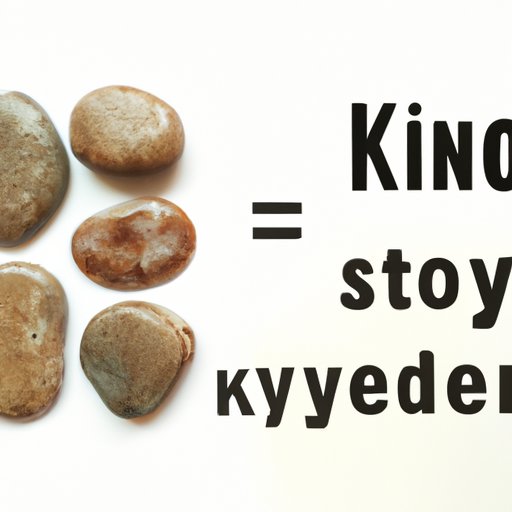
I. Introduction
Kidney stones are a common condition that affects millions of people worldwide. They occur when there is a buildup of calcium oxalate, uric acid, or other compounds in the urinary tract, which can cause pain and discomfort.
While there are many factors that can contribute to the development of kidney stones, diet is one of the most important. In this article, we will explore the foods that can either help prevent or exacerbate the formation of kidney stones, and provide practical tips and advice for incorporating a kidney stone-friendly diet into your daily routine.
II. 7 Foods to Avoid When You Have Kidney Stones
There are several foods that can contribute to the formation of kidney stones and should be avoided or consumed in moderation:
- Red meat
- Salt
- Sugar
- Caffeine
- Sodas
- Oxalate-rich foods (such as spinach, rhubarb, and almonds)
- Processed foods
These foods can affect the body in different ways, such as increasing the levels of calcium and uric acid in the urine, which can lead to the formation of stones. Instead of these foods, try consuming healthier alternatives such as:
- Lean protein sources like chicken and fish
- Low-sodium seasonings such as herbs and spices
- Fresh fruits and vegetables
- Decaffeinated or low-caffeine beverages
- Natural fruit juices
- Foods low in oxalate such as kale, sweet potatoes, and celery
- Whole, unprocessed foods
III. The Ultimate Kidney Stone Diet: Foods You Should Incorporate into Your Diet
While there is no one-size-fits-all diet that can prevent kidney stones, a kidney stone-friendly diet typically includes a varied assortment of foods that are high in certain nutrients and low in others. Here are some examples of foods that are beneficial for preventing kidney stones:
- Citrus fruits: These are high in citrate, which helps prevent the formation of stones.
- Calcium-rich foods: Contrary to popular belief, consuming calcium-rich foods can actually help prevent kidney stones, as they bind with oxalate in the gut and prevent it from entering the bloodstream and urinary tract.
- Low-sodium foods: High sodium intake can lead to increased calcium levels in the urine, which can contribute to stone formation.
- Magnesium-rich foods: Magnesium plays a key role in preventing calcium from binding with oxalate and forming stones.
- Water-rich foods: These can help keep the body hydrated, which is important for preventing stones.
IV. How to Eat Your Way Out of Kidney Stones: An In-Depth Guide to a Kidney Stone-Friendly Diet
Here are some more detailed tips for following a diet that can help prevent kidney stones:
- Plan your meals around fresh, whole foods that are high in nutrients and low in sodium and oxalate.
- Aim to consume at least 2-3 liters of water per day.
- Incorporate citrus fruits, low-fat dairy products, and leafy greens into your diet.
- Sneak in magnesium-rich foods like nuts and seeds as snacks throughout the day.
- Avoid processed foods, sodas, and artificial sweeteners as much as possible.
- Reduce your intake of red meat and instead opt for lean protein sources like chicken and fish.
- Explore new recipe ideas that incorporate kidney stone-friendly ingredients, such as smoothies made from leafy greens and citrus fruits, or salads with low-oxalate veggies and lean protein.
- Stay mindful of portion sizes and always consult with a healthcare provider before making drastic dietary changes.
V. The Science Behind Why Some Foods Cause Kidney Stones
Kidney stones develop when the levels of certain compounds such as calcium and oxalate are too high in the urine. Certain foods can increase the concentration of these compounds, leading to increased risk of stone formation. Additionally, dehydration can cause the urine to become more concentrated, which can increase the risk of stone development.
VI. Recipes to Help Prevent Kidney Stones: Creative Ideas for Kidney Stone-Friendly Dishes
Here are a few recipe ideas for dishes that incorporate kidney stone-friendly ingredients:
- Kale and chicken salad with a citrus vinaigrette dressing
- Grilled salmon with roasted sweet potatoes and asparagus
- Homemade hummus with raw celery and carrot sticks for dipping
- Whole-grain pasta with tomato sauce and lean ground chicken
- Spinach and strawberry smoothie with non-dairy milk and chia seeds
VII. The Importance of Hydration: How Water Plays a Crucial Role in Managing Kidney Stones
Staying hydrated is crucial for preventing kidney stones, as it helps to dilute the concentration of compounds in the urine that can cause stone development. Aim to consume at least 2-3 liters of water per day, and consider incorporating water-rich foods like cucumbers and watermelon into your snacks and meals.
VIII. Nutritional Supplements and Kidney Stones: How Vitamins and Minerals Can Help Prevent Recurrence
Some nutritional supplements, such as vitamin B6, magnesium, and potassium citrate, may be helpful for individuals prone to kidney stones. However, it is important to consult with a healthcare provider before beginning any supplementation regimen, as some supplements may interact with medications or have unwanted side effects.
IX. Conclusion
A kidney stone diagnosis can be scary and overwhelming, but making dietary changes can help prevent recurrence and improve overall kidney health. By incorporating kidney stone-friendly foods into your meals and snacks, staying hydrated, and limiting your intake of processed and high-oxalate foods, you can take control of your health and reduce your risk of kidney stones.




